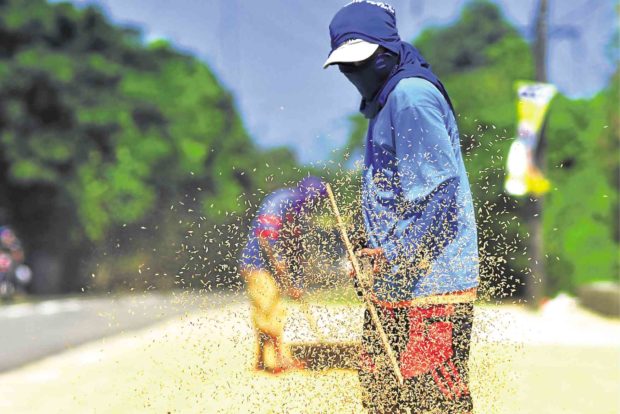KMP: Using cash grants to buy local grains is ‘poor helping poor’

GRAINS GENTLY FALL A farmworker spreads palay (unhusked rice) for drying along the shoulder of the Pangasinan-Tarlac highway in Aguilar town, Pangasinan province. Farmers in rice-producing provinces in northern and central Luzon have been complaining of falling grain prices. —WILLIE LOMIBAO
MANILA, Philippines – A group claims that government could have not resorted to using the P29-billion conditional cash transfer funds to buy palay from local farmers had they not passed the Rice Liberalization Law.
According to the Kilusang Magbubukid ng Pilipinas (KMP), this proposal, which would mean that instead of cash, rice subsidies would be given to poor Filipino families under the Pantawid Pamilyang Pilipino Program (4Ps), is a case of poor people helping the poor.
“What about the accountability of the rich which are mostly rice traders and importers? What about the accountability of the government that approved the rice liberalization law?” KMP said in a statement on Thursday.
“Government officials find it difficult to solve the problems they themselves created. They rammed and approved RA 11203 despite strong opposition from rice farmers. Now, they are bending their backs to look for remedies. It’s still the farmers who are on the losing end,” the group added.
Republic Act No. 11203, or the Rice Liberalization Law which amended R.A. 8178 or the Agricultural Tariffication Act, was signed by President Rodrigo Duterte in February. This opened the country to unimpeded importation of rice from other countries.
Article continues after this advertisementIt was seen to stabilize increasing rice prices in 2018 and the early part of the 2019, aside from solving an impending rice shortage as some of the National Food Authority (NFA) rice were found to be infested with weevils or bukbok.
Article continues after this advertisementREAD: Rice tariffication signed into law
Last Wednesday, Senate approved on second reading a measure that would adopt this form of subsidy. This came after the Senate committee on agriculture and agrarian reform approved Senate Joint Resolution No. 8, signed by 14 senators.
Instead of just cash, 4Ps beneficiaries would receive rice subsidies worth around P600 or 20 kilograms of rice.
READ: Senate OKs measure converting gov’t cash subsidy to rice on 2nd reading
KMP spokesperson Danilo Ramos said this suggestion is just a short-term remedy, as it does not address the root of the problem.
“The government can approve and implement this measure which is actually a palliative to the dire effects of rice liberalization. However, this procurement should be on top of the National Food Authority’s obligation to buy a significant percentage of farmers’ palay production,” Ramos said.
“We are proposing that the NFA buy at least 10 percent of the total palay production at Php20 per kilo with incentives,” he added.
Ramos also urged government to purchase the palay at a higher price so that farmers, especially those who are struggling due to the law, would be compensated properly.
“Government have various fund sources which may be used to buy palay from farmers. What should be done is for government to stop disadvantaging farmers, and give them incentives,” he noted.
Just recently, a consumer group warned of a possible market failure as the Rice Liberalization Law not only failed to significantly reduce rice prices, it also flooded the country with cheaper but substandard grains.
Farmers are allegedly losing income because even if their grains are of a high quality, they cannot match the low prices of imported rice. /jpv